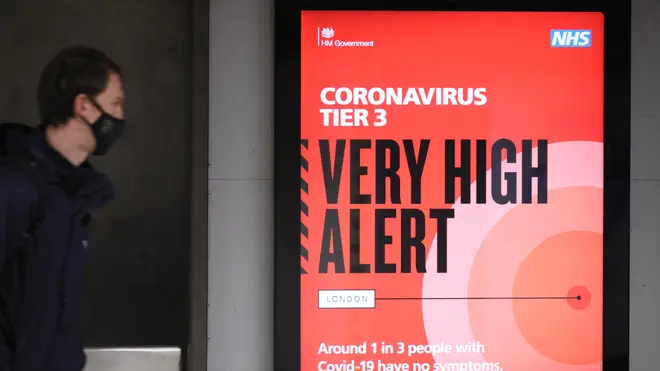
Oli Dugmore 4am - 7am
18 December 2020, 13:42 | Updated: 18 December 2020, 14:25

The UK's coronavirus R number has risen to between 1.1 and 1.2, SAGE have confirmed.
This is an increase from last week, when the R number was between 0.9 and 1.
R represents the average number of people each Covid-19 positive person goes on to infect.
When the figure is above 1, an outbreak can grow exponentially.
An R number between 1.1 and 1.2 means that, on average, every 10 people infected will infect between 11 and 12 other people.
Experts advising the Government have revealed all NHS England regions have R estimates that are above or span 1, suggesting the epidemic is growing in much of the country.
The East of England, South East and London now have R estimates well above 1, they said.
Read more: Boris Johnson 'hopes to avoid' third lockdown but doesn't rule it out
Read more: Online calculator estimates how soon you're likely to get the coronavirus vaccine

Impact of Covid-19 is "not a debate," says frontline worker
The estimates for R and the growth rate are provided by the Scientific Pandemic Influenza Group on Modelling (SPI-M), a sub-group of Sage.
The growth rate, which estimates how quickly the number of infections is changing day by day, is between plus 1% and plus 4% for the UK as a whole.
It means the number of new infections is growing by between 1% and 4% every day.
Estimates for R and growth rates are shown as a range and the true values are likely to lie within this range, according to the experts.
Sage also said the figures published on Friday more accurately represent the average situation over the past few weeks rather than the present situation.
Read more: Christmas relaxations could lead to Covid 'tsunami', nursing chief warns
Read more: Boris Johnson says reduce contact from today if you are forming 'Christmas bubble'

Boris Johnson 'hopes to avoid' third lockdown but doesn't rule it out
The proportion of people testing positive for Covid-19 is estimated to have increased sharply in London, with other increases in Eastern England, the East Midlands and south-east England, the ONS said.
Rates have continued to decrease in north-west England and Yorkshire & the Humber.
The East Midlands has the highest rate (with an estimated 1.4% of people in private households testing positive for Covid-19), followed by London (1.4%) and north-east England (1.2%).
South-west England has the lowest rate (0.4%).
When modelling the level of infection among different age groups in England, the ONS said rates have increased in most age groups, except for young adults (school year 12 to age 24) and 50 to 69-year-olds.
Rates had been decreasing among young adults but this trend appears to have levelled off, with rates remaining highest among secondary school-aged children (school years 7 to 11).

LBC callers have fiery clash over Christmas Covid rules
Earlier on Friday, the Prime Minister refused to rule out the possibility of a third national lockdown in England, but said he's "hoping" the country will be able to avoid it.
When asked about the possibility of another lockdown after Christmas, Mr Johnson said: "We’re hoping very much we’ll be able to avoid anything like that".
Speaking during a visit to Greater Manchester, Mr Johnson said the rates of infection have increased "very much" in the past few weeks.
It comes as ministers are reportedly considering bringing in Tier 4 restrictions, in which people would be told to stay at home with commuting banned, schools would stay shut for an extra week, and non-essential shops would be shut.